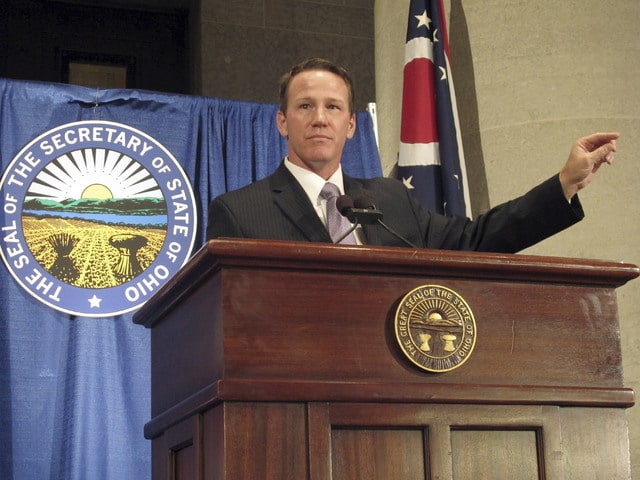

Associated Press
Eds: Adds details on ‘grandfather clause’ revision. With AP Photos.
COLUMBUS, Ohio (AP) — Ohio voters will see new ballot wording used to describe a proposal to legalize marijuana, after a state board met Friday to rewrite phrasing that the state Supreme Court ruled was misleading.
The proposed constitutional amendment, known as Issue 3, would let people 21 and older buy marijuana for medicinal or recreational use. It creates a network of 10 authorized growing locations along with a taxation and regulatory scheme. Voters will decide the issue in the Nov. 3 election. Early voting begins Oct. 6.
The group ResponsibleOhio, which backs the proposal, had challenged the issue’s ballot language and title, claiming some phrasing approved by the state’s Ballot Board last month was inaccurate and misleading.
On Wednesday, the high court ordered the board to reconvene and replace four paragraphs detailing certain requirements for marijuana retailers, the amount of marijuana a person can grow and transport, and the potential for additional growing facilities.
The five-member board held an emergency meeting Friday in Columbus, where they revised the phrasing.
Among other changes, the panel made clear where marijuana establishments could open and that people age 21 years and older must hold a valid license to grow up to 8 ounces of marijuana plus four plants. The board added wording that one additional growing facility could be allowed in four years only if the existing ones couldn’t meet consumer demand.
After weeks of dispute about the phrasing, there were few remarks on the board’s changes.
Attorneys for backers and opponents of Issue 3 said they were satisfied with the revisions and found them accurate.
The board also accepted a request from former Sen. Nina Turner, a Democrat on the panel, to scrap the ballot’s use of the phrase “grandfather clause” to ensure a gender-neutral description.
Secretary of State Jon Husted, who chairs the Ballot Board, told reporters that about 230 absentee ballots slated to be sent Saturday to military and overseas voters will go out as planned with the new wording.
“These were mostly reordering some of the language and adding some words to clarify it,” Husted said. “I didn’t think that there was anything that the court asked us to do that I didn’t find acceptable.”
Husted, who personally opposes Issue 3, said the ballot wording contains two words he felt were important to describe the proposal: “monopoly” and “recreational.”
The court allowed the ballot issue’s title to stand — “Grants a monopoly for the commercial production and sale of marijuana for recreational and medicinal purposes.” That decision was a blow to ResponsibleOhio, which had challenged the use of “monopoly” and preferred “personal” to “recreational” use.
Ian James, ResponsibleOhio’s executive director, told reporters that his campaign would have to live with the ballot title, but he believed voters would be more likely to vote yes for the pot proposal with the revised ballot language.
“What we had before was fatally flawed,” James said. “It was very clearly biased. It needed to be changed and today it was.”
___
Online:
Issue 3 ballot language: http://bit.ly/1HUzj1U



